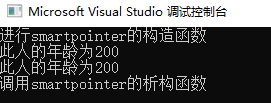本文主要是介绍c++类的练习 封装tv遥控器、智能指针的类,希望对大家解决编程问题提供一定的参考价值,需要的开发者们随着小编来一起学习吧!
一、tv遥控器的模拟
#include<iostream>
using namespace std;
class TV {friend class Remote;
public:enum {on, off};enum{minvolume, maxvolume = 50};enum{minchannel, maxchannel = 150};TV(){mstate = 0;volume = 0;channel = 0;}void turntv() {this->mstate == this->mstate == on ? off:on;}void upchannel() {if (this->channel >= maxchannel ){return;}this->channel++;}void downchannel() {if (this->channel <= minchannel) {return;}this->channel--;}void upvolume() {if (this->volume >= maxvolume){return;}this->volume++;}void downvolume() {if (this->volume <= minvolume){return;}this->volume--;}void showinfo(){cout << "当前电视为" << (mstate == on ? "开启状态" : "关闭状态") << endl;cout << "当前频道为" << channel << endl;cout << "当前音量为" << volume << endl;}private:int mstate;int volume;int channel;
};
class Remote {
public:Remote(TV *teletvtion) {mtv = teletvtion;}
public:void turn() { mtv->turntv(); }void upchannel(){mtv->upchannel();}void downchannel(){mtv->downchannel();}void upvolume() { mtv->upvolume(); }void downvolume() { mtv->downvolume(); }void showinfo() { mtv->showinfo(); }void setchannel(int channel){if (channel >= mtv->maxchannel || channel <= mtv->minchannel){cout << "无当前频道" << endl;return;}mtv->channel = channel;}
private:TV* mtv;
};
void test03()
{TV tv1;tv1.turntv();tv1.upchannel();tv1.upvolume();tv1.upvolume();tv1.showinfo();
}
void test02()
{TV tv2;Remote tv2cont(&tv2);tv2cont.turn();tv2cont.upchannel();tv2cont.upchannel();tv2cont.showinfo();tv2cont.setchannel(15);tv2cont.showinfo();
}
void main()
{test02();
}二、智能指针(指针运算符(*、->)重载)
#include<iostream>
using namespace std;
class Person {
public:Person(int age){m_age = age;}void showinfo(){cout << "此人的年龄为" << m_age << endl;}
private :int m_age;
};
class smartpointer {
public:smartpointer(Person* people){m_person = people;cout << "进行smartpointer的构造函数" << endl;}~smartpointer(){if (m_person != NULL){delete m_person;m_person == NULL;}cout << "调用smartpointer的析构函数" << endl;}Person* operator->()//返回地址{return m_person;}Person& operator*()//返回地址中的内容(类){return *m_person;}
private:Person* m_person;
};
void test04()
{smartpointer ti = smartpointer(new Person(200));ti->showinfo();(*ti).showinfo();
}
void main() {test04();
}
结果:

通过智能指针的实现,在函数中使用new从栈区开辟空间后,不用手动delete,在类中析构函数会自动进行delete操作。smartpointer ti = smartpointer(new Person(200));中,首先通过new在栈区中开辟地址,紧接着通过smartpointer中的构造函数使其类中的指针成员m_person指向new开辟的地址,紧接着通过对->与*的重载操作new开辟的person类的地址。
智能指针的实现虽然使得在函数中不需要手动调用delete释放空间,但是在函数中的临时空间在函数结束后被立刻释放,无法保存。
此类方法实际中很少使用。
这篇关于c++类的练习 封装tv遥控器、智能指针的类的文章就介绍到这儿,希望我们推荐的文章对编程师们有所帮助!








